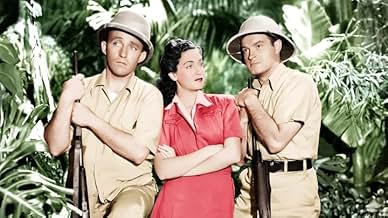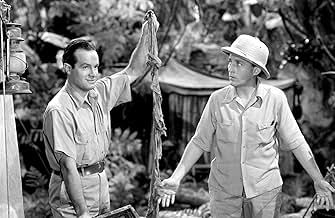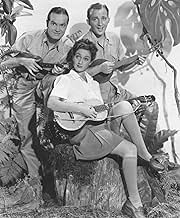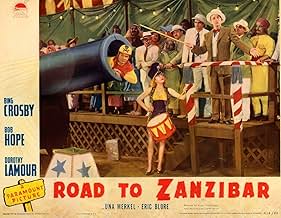IMDb-BEWERTUNG
6,7/10
3479
IHRE BEWERTUNG
Füge eine Handlung in deiner Sprache hinzuStranded in Africa, Chuck and his pal Fearless have comic versions of jungle adventures, featuring two attractive con women.Stranded in Africa, Chuck and his pal Fearless have comic versions of jungle adventures, featuring two attractive con women.Stranded in Africa, Chuck and his pal Fearless have comic versions of jungle adventures, featuring two attractive con women.
- Auszeichnungen
- 3 wins total
John Ralph Bilbo
- Solomon
- (Nicht genannt)
Al Bridge
- Colonial Policeman with Inspector
- (Nicht genannt)
Ken Carpenter
- Commentator
- (Nicht genannt)
Empfohlene Bewertungen
Of the comedy teams that made a series of movies in the 1940s and 1950s, Hope and Crosby were probably the most engagingly amusing.
Abbott and Costello were usually silly. Their movies seemed aimed at an audience of children, although some, like "Meet Frankenstein", are outrageous. There was an element of sadism too, with Abbott (always the humorless straight man) slapping the helpless Costello around and snarling at him, a standard relationship left over I guess from vaudeville where clowns batted each other over the head with bladders.
Martin and Lewis were clearly differentiated. Martin was the parent and Lewis was the twelve-year-old child. It all seems a bit much, now.
But Hope and Crosby were the most nearly equal. Crosby was the smooth-talking crooner. Both were cowards but Hope was a braggart too, a stock figure in the comedies of Ancient Rome and afterward. I think the figure was called miles gloriosus. What they had that the other teams didn't, and what's on good display here, is a kidding quality that consists of trying to outwit one another, competition for the girl (Dorothy Lamour), inside jokes, and a kind of comfortably relaxed unspoken friendship that draws the audience in.
In many ways the funniest scene is when Hope and Crosby realize they've been double crossed by Lamour and set out to find her and tell her off. They discover some shreds of her clothing and conclude, mistakenly, that she's been eaten by leopards and carried off. (Hope: "They didn't even leave an ear. What hogs those leopards are.") The two men try to mourn her passing in a sincere and dignified way but their anger at her keeps simmering to the surface. They interrupt their weeping to recite some poetry over her buried clothing but they don't know any poems. Hope starts off with, "A bunch of the boys were whooping it up/ in the Malamut saloon..." Crosby chides him and instead begins to recite "Casey at the Bat." The scene simply cracks me up. Crosby: "She was just a kid." Hope: "We'll miss her. Even though she was WRONG!" When they realize she's still alive they sneer and kick away the dirt from her "grave."
I don't think of "The Road to Zanzibar" as necessarily their best Road picture, although it's right up there with "Utopia" and "Morocco." It was basically their first though. The earlier "Road to Singapore" lacked the lazy improvisational impression that this one has. "Singapore" seems, in retrospect, too well plotted, if you can imagine. You've gotta give these guys a little room to kick out.
The plot's absurd anyway. Africa on the Paramount set, with phony drums and "natives" and a guy in a gorilla suit engaged in a professional wrestling match with Hope. Actually, Hope's pretty amusing. Woody Allen has said that he picked up quite a few of Hope's comic mannerisms to use in his own performances. (See also Hope's "They've Got Me Covered," a classic of its kind, so to speak.) And Crosby is a necessary counterpart to Hope's physicality. The two work very well together.
I'll have to throw in one of their exchanges. The pair find themselves broke and stranded in a small African town.
Hope (gloomily): "This must be the nowhere that people say they're 500 miles from."
Crosby: "Well don't blame me. We wouldn't be here if you hadn't sold the map to that diamond mine."
Hope: "Hah! It's your fault! If you hadn't bought it I wouldn't have had it. And if I didn't have it I couldn't sell it. So if I couldn't sell it, then we wouldn't be stuck here, would we?"
Crosby: "Nope."
Hope (looks doubtful for a moment, thinking hard): "I don't get it."
Their movies also produced a number of popular songs, some of which have become standards. This one has "It's Always You." Others have songs like "Moonlight Becomes You."
You'll probably enjoy this one. If you're in the proper mood, it will crack you up.
Abbott and Costello were usually silly. Their movies seemed aimed at an audience of children, although some, like "Meet Frankenstein", are outrageous. There was an element of sadism too, with Abbott (always the humorless straight man) slapping the helpless Costello around and snarling at him, a standard relationship left over I guess from vaudeville where clowns batted each other over the head with bladders.
Martin and Lewis were clearly differentiated. Martin was the parent and Lewis was the twelve-year-old child. It all seems a bit much, now.
But Hope and Crosby were the most nearly equal. Crosby was the smooth-talking crooner. Both were cowards but Hope was a braggart too, a stock figure in the comedies of Ancient Rome and afterward. I think the figure was called miles gloriosus. What they had that the other teams didn't, and what's on good display here, is a kidding quality that consists of trying to outwit one another, competition for the girl (Dorothy Lamour), inside jokes, and a kind of comfortably relaxed unspoken friendship that draws the audience in.
In many ways the funniest scene is when Hope and Crosby realize they've been double crossed by Lamour and set out to find her and tell her off. They discover some shreds of her clothing and conclude, mistakenly, that she's been eaten by leopards and carried off. (Hope: "They didn't even leave an ear. What hogs those leopards are.") The two men try to mourn her passing in a sincere and dignified way but their anger at her keeps simmering to the surface. They interrupt their weeping to recite some poetry over her buried clothing but they don't know any poems. Hope starts off with, "A bunch of the boys were whooping it up/ in the Malamut saloon..." Crosby chides him and instead begins to recite "Casey at the Bat." The scene simply cracks me up. Crosby: "She was just a kid." Hope: "We'll miss her. Even though she was WRONG!" When they realize she's still alive they sneer and kick away the dirt from her "grave."
I don't think of "The Road to Zanzibar" as necessarily their best Road picture, although it's right up there with "Utopia" and "Morocco." It was basically their first though. The earlier "Road to Singapore" lacked the lazy improvisational impression that this one has. "Singapore" seems, in retrospect, too well plotted, if you can imagine. You've gotta give these guys a little room to kick out.
The plot's absurd anyway. Africa on the Paramount set, with phony drums and "natives" and a guy in a gorilla suit engaged in a professional wrestling match with Hope. Actually, Hope's pretty amusing. Woody Allen has said that he picked up quite a few of Hope's comic mannerisms to use in his own performances. (See also Hope's "They've Got Me Covered," a classic of its kind, so to speak.) And Crosby is a necessary counterpart to Hope's physicality. The two work very well together.
I'll have to throw in one of their exchanges. The pair find themselves broke and stranded in a small African town.
Hope (gloomily): "This must be the nowhere that people say they're 500 miles from."
Crosby: "Well don't blame me. We wouldn't be here if you hadn't sold the map to that diamond mine."
Hope: "Hah! It's your fault! If you hadn't bought it I wouldn't have had it. And if I didn't have it I couldn't sell it. So if I couldn't sell it, then we wouldn't be stuck here, would we?"
Crosby: "Nope."
Hope (looks doubtful for a moment, thinking hard): "I don't get it."
Their movies also produced a number of popular songs, some of which have become standards. This one has "It's Always You." Others have songs like "Moonlight Becomes You."
You'll probably enjoy this one. If you're in the proper mood, it will crack you up.
ROAD TO ZANZIBAR (Paramount, 1941), directed by Victor Schertzinger, reunites director with his ROAD TO SINGAPORE (1940) players, Bing Crosby, Dorothy Lamour and Bob Hope. While this edition could very well have been a rehash from their initial teaming or a continuation to where the previous film left off, this second installment, having its major stars assuming new character roles, has not only become a sequel in name only but a much funnier outing by ways of jokes and incidents revolving around Hope and Crosby. Hardly resembling ROAD TO SINGAPORE by any means, ZANZIBAR can easily be categorized as the official opener to what has become relatively known as the "Road Pictures."
The plot revolves around boyhood pals Chuck Reardon (Bing Crosby) and Hubert "Fearless" Frazier (Bob Hope), working in a carnival where Chuck is a smooth talking con man and "Fearless" the daredevil who gets shot out of a cannon flying through a hoop of fire at a distance. Using a dummy in Frazier's place (is there a difference?), the act comes to a halt when the dummy obtains the fire, lands on one of the tents, and burns down the carnival, causing our heroes to make a run for it. Traveling on the road to Mugabund, Kipungo and Molanda, Frazier, after five years of traveling with his pal through sideshow acts, wants to break with the act and return home to Birch Falls. There's one thing standing in his way, and that's Chuck. Having paid Charles Kimball (Eric Blore) $5,000 of his pals savings for the map leading to a diamond mine, it is discovered the map is worthless. Fearless decides to get his money back by passing the map over to Le Bec (Lionel Royce). Discovering he's been tricked, Le Bec and his henchman (Buck Woods) go after them, forcing our heroes to make another run for it, this time on a boat to Zanzibar. While there, Chuck and Fearless meet up with Julia Quimby (Una Merkel), a woman in distress who asks the boys for money to rescue her abducted friend, Donna Latour (Dorothy Lamour) from a slave auction. With all that done, the boys further assist the girls by teaming up in a safari to help Donna locate her long lost brother, who, in actuality is only using the boys to help her meet with J. Theodore Brady, a millionaire whom she plans to marry. Realizing they've been tricked by a couple of American showgirls from Brooklyn, Chuck and Fearless break away from them, getting themselves lost in the jungle and ending up in the middle of a hostile native tribe. Paging Tarzan!
In spite of Dorothy Lamour now being part of the Hope and Crosby teaming, her scenes, though prominent, are actually secondary. While her character as well as Merkel's appears mid-way to limited results before disappearing during another long stretch before reappearing, the film overall belongs to Hope and Crosby from start to finish. Song numbers are at a minimum this time around, with new songs by James Van Husen and Johnny Burke, including: "You Lucky People You" (sung by Bing Crosby during opening titles and story introduction); "African Etude" (sung by natives chanting "Ba-toom-bomba"); "The Road to Zanzibar" (sung by Crosby); "You're Dangerous" (sung by Dorothy Lamour); and "It's Always You" (sung by Crosby). Interestingly, Hope doesn't get to sing any songs this time around. Although some sources credit "Birds of a Feather" to have been scored for the film, this, along with a cameo by Leo Gorcey, do not appear in circulating prints.
With Hope supplying much to the comedy and one-liners, Crosby also demonstrates his flare for comedy as well. Aside from their their traditional "paddy cake" routine, other highlights include Hope's wrestling with a gorilla (guess who wins), and their encounter with natives (with subtitles translating to what they're saying). Others in the cast include Douglass Dumbrille (The Slave Trader); Joan Marsh (Dimples); and Luis Alberni, Paul Porcasi and Leigh Whipper in smaller roles.
In spite of its fine slapstick and gags keeping the story moving at a brisk pace, ROAD TO ZANZIBAR, has become one of seven "Road" movies not be as well known or revived as the others, namely SINGAPORE (1940), MOROCCO (1942) and UTOPIA (1946). ZANZIBAR, along with the others in the series, have been readily available on home video and DVD, along with occasional cable TV broadcasts on American Movie Classics (1995-2000) and Turner Classic Movies(2005-2006, 2010-present). As a satire on jungle movies, ROAD TO ZANZIBAR is as good as it gets, you lucky people you. Next installment: ROAD TO MOROCCO (1942), hailed by many to be the wildest and funniest yet. (***)
The plot revolves around boyhood pals Chuck Reardon (Bing Crosby) and Hubert "Fearless" Frazier (Bob Hope), working in a carnival where Chuck is a smooth talking con man and "Fearless" the daredevil who gets shot out of a cannon flying through a hoop of fire at a distance. Using a dummy in Frazier's place (is there a difference?), the act comes to a halt when the dummy obtains the fire, lands on one of the tents, and burns down the carnival, causing our heroes to make a run for it. Traveling on the road to Mugabund, Kipungo and Molanda, Frazier, after five years of traveling with his pal through sideshow acts, wants to break with the act and return home to Birch Falls. There's one thing standing in his way, and that's Chuck. Having paid Charles Kimball (Eric Blore) $5,000 of his pals savings for the map leading to a diamond mine, it is discovered the map is worthless. Fearless decides to get his money back by passing the map over to Le Bec (Lionel Royce). Discovering he's been tricked, Le Bec and his henchman (Buck Woods) go after them, forcing our heroes to make another run for it, this time on a boat to Zanzibar. While there, Chuck and Fearless meet up with Julia Quimby (Una Merkel), a woman in distress who asks the boys for money to rescue her abducted friend, Donna Latour (Dorothy Lamour) from a slave auction. With all that done, the boys further assist the girls by teaming up in a safari to help Donna locate her long lost brother, who, in actuality is only using the boys to help her meet with J. Theodore Brady, a millionaire whom she plans to marry. Realizing they've been tricked by a couple of American showgirls from Brooklyn, Chuck and Fearless break away from them, getting themselves lost in the jungle and ending up in the middle of a hostile native tribe. Paging Tarzan!
In spite of Dorothy Lamour now being part of the Hope and Crosby teaming, her scenes, though prominent, are actually secondary. While her character as well as Merkel's appears mid-way to limited results before disappearing during another long stretch before reappearing, the film overall belongs to Hope and Crosby from start to finish. Song numbers are at a minimum this time around, with new songs by James Van Husen and Johnny Burke, including: "You Lucky People You" (sung by Bing Crosby during opening titles and story introduction); "African Etude" (sung by natives chanting "Ba-toom-bomba"); "The Road to Zanzibar" (sung by Crosby); "You're Dangerous" (sung by Dorothy Lamour); and "It's Always You" (sung by Crosby). Interestingly, Hope doesn't get to sing any songs this time around. Although some sources credit "Birds of a Feather" to have been scored for the film, this, along with a cameo by Leo Gorcey, do not appear in circulating prints.
With Hope supplying much to the comedy and one-liners, Crosby also demonstrates his flare for comedy as well. Aside from their their traditional "paddy cake" routine, other highlights include Hope's wrestling with a gorilla (guess who wins), and their encounter with natives (with subtitles translating to what they're saying). Others in the cast include Douglass Dumbrille (The Slave Trader); Joan Marsh (Dimples); and Luis Alberni, Paul Porcasi and Leigh Whipper in smaller roles.
In spite of its fine slapstick and gags keeping the story moving at a brisk pace, ROAD TO ZANZIBAR, has become one of seven "Road" movies not be as well known or revived as the others, namely SINGAPORE (1940), MOROCCO (1942) and UTOPIA (1946). ZANZIBAR, along with the others in the series, have been readily available on home video and DVD, along with occasional cable TV broadcasts on American Movie Classics (1995-2000) and Turner Classic Movies(2005-2006, 2010-present). As a satire on jungle movies, ROAD TO ZANZIBAR is as good as it gets, you lucky people you. Next installment: ROAD TO MOROCCO (1942), hailed by many to be the wildest and funniest yet. (***)
Bing Crosby, Bob Hope and Dorothy Lamour are at it again in the second film of the "Road Series" which follows "Road to Singapore" produced a year earlier. However, although the three actors have returned their characters are completely different. For example, Bing Crosby plays a con-man named "Chuck" who is constantly coming up with dangerous acts to use in a circus. Bob Hope plays his best friend "Fearless Frazier" who is generally the one who risks his life in whatever dangerous scheme Chuck has concocted. Yet for all of their experience in the confidence field they somehow end up being taken for a ride by a woman named "Donna Latour" (Dorothy Lamour) and her friend "Julia Quimby" (Una Merkel) who manage to convince them to take them on a long safari through the African jungle but conveniently leaves out the real reason Donna and Julia want to get there-so that Donna can marry a young millionaire. But what none of the four realize is just how dangerous this safari ends up becoming. Now rather than reveal any more I will just say that I thought this movie was a little bit better than its predecessor due in large part to the better coherence between the scenes. Likewise, the action was a little better as well. In any case, this was an entertaining comedy for the most part and I have rated it accordingly. Slightly above average.
10eearwigg
I think that Road to Zanzibar is hilarious, one of the best Road movies. The gorilla fight made me laugh the hardest. I would recommend all of the Road movies, if you liked this one. The singing and all of the jokes were great. Bob Hope is one of the funniest people, and in my mind, he is still alive...kinda.
"The Road to Zanzibar" scores in all departments! The interplay between Hope, Crosby, and Lamour is outstanding. A wonderful addition to this trio comes in the form of Una Merkel, playing Lamour's friend. She and Bob Hope made an inspired dream comedy team. Their scenes together are hilarious. Dorothy Lamour displayed a biting comic edge to her lines not usually displayed in her comedies.
The photography is moody, diffuse, reminiscent of von Sternberg's films. A real treat for comedy and cinema fans!
The photography is moody, diffuse, reminiscent of von Sternberg's films. A real treat for comedy and cinema fans!
Wusstest du schon
- PatzerWhen Lamour and Crosby are in the rowboat on the lake, harp music plays when they dangle their hands in the water. At the end of the song Crosby sings, the harp music begins before Lamour puts her hand in the water. You can see her surprised look when she realizes she is late.
- Zitate
Chuck Reardon: Everybody knows him. He's a philathropist.
Hubert 'Fearless' Frazier: I don't care who he votes for. I want my money.
- VerbindungenFeatured in The 69th Annual Academy Awards (1997)
- SoundtracksRoad to Zanzibar
(uncredited)
Music by Jimmy Van Heusen
Lyrics by Johnny Burke
[Sung by Bing Crosby and chorus while on safari]
Top-Auswahl
Melde dich zum Bewerten an und greife auf die Watchlist für personalisierte Empfehlungen zu.
- How long is Road to Zanzibar?Powered by Alexa
Details
- Laufzeit1 Stunde 31 Minuten
- Farbe
- Seitenverhältnis
- 1.37 : 1
Zu dieser Seite beitragen
Bearbeitung vorschlagen oder fehlenden Inhalt hinzufügen

Oberste Lücke
By what name was Der Weg nach Sansibar (1941) officially released in India in English?
Antwort
































